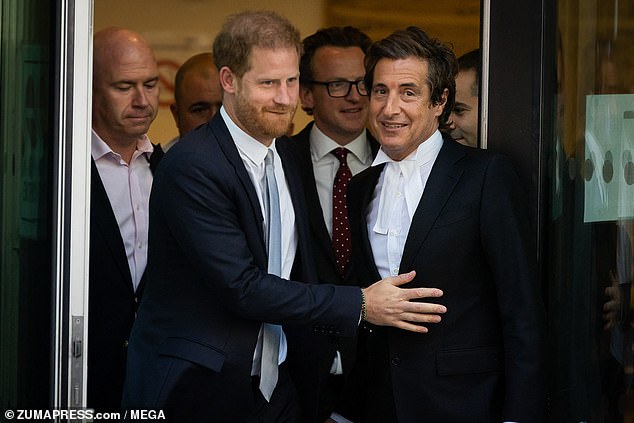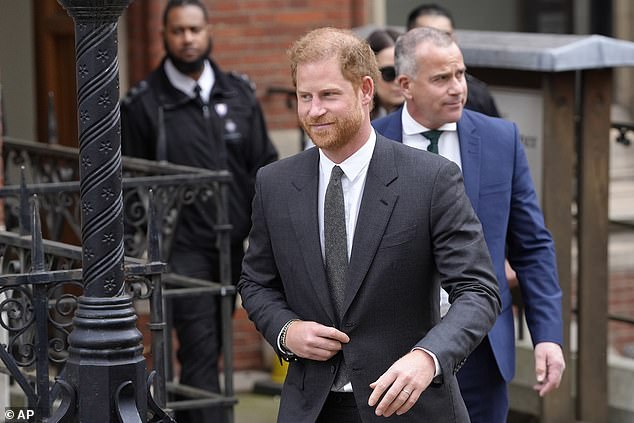Prince Harry is ordered by judge to explain himself after being accused of ‘deliberately destroying’ messages with Spare ghostwriter after launching case against The Sun newspaper
Prince Harry has been accused of “deliberately destroying” potential evidence in his case against the publisher of The Sun newspaper – and has been ordered by a High Court judge to explain himself.
Judge Fancourt said it was “disturbing” that a large number of messages between the Duke and the ghostwriter of his memoirs, Spare, had been deleted “long after” he had launched phone-hacking claims against the tabloid’s publisher.
He instructed Harry to write a statement to make ‘transparently clear’ what had happened.
The Duke and 40 others are suing News Group Newspapers (NGN) for phone hacking and other illegal activities. The trial is expected to begin in January 2025.
At a preliminary hearing on Thursday, NGN asked the judge to give Harry’s side hand on a trove of documents that may contain evidence relevant to the case.
Among them were messages exchanged between the Duke and JR Moehringer, which Spare wrote, published in January 2023.
Prince Harry (pictured in May 2024) is accused of ‘deliberately destroying evidence’ in his case against the publisher of The Sun newspaper

JR Moehringer wrote Harry’s memoir Spare, which was published in January 2023
The American author later admitted in an interview that he and Harry were texting ’round the clock’ and that ‘no subject was taboo’.
Mr Fancourt said it was “inherently likely” that “things would have been said” by the pair that could be relevant to the case, which was launched in 2019. But the messages on the Signal messaging app were said to have been deleted.
The judge said: ‘I have seen disturbing evidence that a large number of potentially relevant documents and confidential communications between the Duke and the ghostwriter of Spare were destroyed at some point between 2021 and 2023, long after this claim was made. The position is not transparent and clear about what happened, and needs to be corroborated by the claimant’s own witness statement.’
In previous dramatic exchanges, NGN’s barrister Anthony Hudson KC said: ‘It is, I fear, yet another example of the obfuscation in the claimant’s case. We say it is shocking and extraordinary that the plaintiff willfully destroyed….”
At this point Mr Fancourt intervened and said: ‘Well, we don’t know what happened. It’s not clear at all.’
Harry’s lawyer David Sherborne confirmed that “the entire chat history has been deleted”, but said: “This was a very necessary process, not to hide anything, but to remove very sensitive information about him. [Harry] and the royal family, which, if leaked, would not only jeopardize its safety but also be potentially damaging to the [duke] and his family.’

Prince Harry and his lawyer David Sherborne leave the Rolls Building at the Royal Courts of Justice in June 2023
Mr Sherborne dismissed the newspaper’s application as ‘an old-fashioned fishing expedition’ and said no records existed of Spare’s publication. He said even drafts of the book had been destroyed.
But he continued to insist: “The idea that there is any obstruction or cover-up is simply nonsense.”
In his ruling, the judge criticized Harry’s lawyers for the “apparent paucity” of documents they had so far handed over to the newspaper in preparation for the trial, in a legal process known as the disclosure phase.
He revealed that earlier this month it had come to light that ‘there was another large group of documents’ that the Royal Household had provided to Harry in 2020, of which Harry’s lawyers were ‘completely unaware’.
Judge Fancourt expressed his “concerns” and said the Duke himself, in California, and not a trained lawyer, had decided which documents might be relevant to the case.
The judge said he sometimes had the impression that even Harry’s lawyers “don’t seem to be grappling with the issue,” and “it would therefore not be at all surprising if the judge” [duke] didn’t quite understand it myself’.
The newspaper’s lawyers also want an investigation into 36,000 emails between Harry and palace staff. Mr Hudson claimed Harry’s lawyers were “kicking and screaming” instead of handing them over.
Mr Sherborne said three Hotmail accounts once belonging to Harry had been deactivated and were no longer accessible.
He said the Duke still has access to email accounts associated with the Royal Family, but which are no longer active.
Mr Sherborne claimed the Duke’s lawyers had spent 130 hours and £50,000 combing through around 35,000 emails and found nothing of relevance. The court was also told there were ‘two encrypted hard drives’ which were said to ‘no longer exist’.

Prince Harry leaves the Royal Courts Of Justice in London on March 30, 2023
However, yesterday morning Harry’s lawyers suddenly announced that they had been ‘found’: one in the Duke’s California mansion and the other in the office of his American lawyer.
NGN said the files may contain relevant material, but Mr Sherborne said the files on the drives contained “office documents” from his time as a working royal and were unlikely to contain anything relevant to the hacking case.
The judge agreed. But separately he ordered a separate search of Harry’s texts and WhatsApps for relevant matters, and said efforts should be made to retrieve the deleted Signal messages containing the ghostwriter.
Meanwhile, two of King Charles’ closest aides have been drawn into the saga. The judge has ordered Harry’s lawyers to write to His Majesty’s private secretaries, Sir Clive Alderton and Sir Michael Stevens, the Keeper of the Privy Purse, requesting that any correspondence with the Duke be made public.
Mr Sherborne called the suggestion that his client had ‘dragged his feet, been dragged around kicking and screaming and set up some sort of obstacle course’ a ‘monstrous characterization’.
Harry had conducted an “extensive search” for possible information, including “a physical search of his California home.”
The Duke has also contacted Lord Christopher Geidt, the former private secretary of Elizabeth II, Sally Osman, the former director of royal communications, Sir David Manning, the former UK ambassador to the US and Nick Loughran, the former deputy communications secretary of the Duke. They said they had no relevant information from that period.
Prince Harry was ordered to make an interim payment of £60,000 to cover publishing costs.
